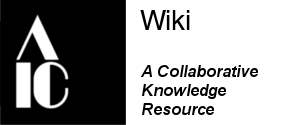BPG Board Attachment
Book and Paper Group Wiki > Book Conservation Wiki > Board Attachment
Board attachment describes the various methods of securing book boards to a text block. Boards can be attached individually to each side of the text block, or they can be attached to an outer covering first, and this unit attached to the textblock. The latter is called a case. In general, boards are either sewn, laced or glued, or some combination of these.
This page discusses and illustrates board attachment methods. For a discussion of treatment techniques for reattaching detached boards, see Board Reattachment.
Wiki Contributors: Pam Barrios, Chris McAffee, please add your name here
Copyright 2025. The AIC Wiki is a publication of the American Institute for Conservation (AIC). It is published as a convenience for the members of AIC. Publication does not endorse nor recommend any treatments, methods, or techniques described herein. Information on researching with and citing the wiki can be found on the Reference and Bibliography Protocols page.
Cite this page:
American Institute for Conservation (AIC). "BPG Board Attachment." AIC Wiki. April 16, 2025. https://www.conservation-wiki.com/wiki/BPG_Board_Attachment.
Sewn boards[edit | edit source]
A continuation of the sewing thread of the text sections is fed through holes in the boards and wrapped around the spine edge of each board. The outermost section of text may be covered and used as boards.
- Cockerell, S. 1977. Ethiopian Binding, Designer Bookbinders Review.
Laced Supports[edit | edit source]
In a supported sewing system, the supports extend beyond the textblock spine and are used to secure the boards. Common supports are cords and tapes. These extended supports are fed through holes made to accept them. In this style of attachment, grooves and channels are often cut to recess the supports and these are “fixed” by paste or animal glue, creating a combination of lacing and gluing. Extensions of the endband sewing can also be used as additional attachments.
- French
SELECTED BIBLIOGRAPHY:
- • Miura, K. T. 1984. My World of Bibliophile Binding. Berkeley: University of California Press.
- Ninth Century
LINKS TO BOOK CONSERVATION CATALOG:
- • Sewing double cord (Herringbone)
REFERENCE MATERIAL:
- • Laura Wait's model from Tony Cain's workshop in Austin, TX.
Laced Case[edit | edit source]
The limp vellum system of covering attaches a case by using a system of lacing. In this instance, gluing is not always necessary
- Limp vellum
SELECTED BIBLIOGRAPHY:
- • Clarkson, C. 1982. Limp Vellum Binding, Herts, England: 1982.
Glued Supports, Hinges, or Other Attachments[edit | edit source]
- Paper Hinges
- One or more outer leaves of the outer sewn sections may be used as a hinge and glued to the boards.
- Cloth Hinges
- A cloth hinge may be hooked around and sewn to the outermost signature of the textblock. This hinge is glued to the boards.
- Bradel
- Spine Linings
- Cloth or vellum may be glued across the spine and extended to create hinges, which are then glued to the boards.
K-118
See link below for journal article and illustrations.
SELECTED BIBLIOGRAPHY:
- • The American Institute for Conservation
- The Restoration Rebinding of Speculum Naturale by Vincent of Beauvais, and the Subsequent Development of Several Options for Conservation Rebinding Structures Based on Details Found During the Restoration. v.6, 1987 p.
- By Bruce R. Levy http://aic.stanford.edu/sg/bpg/annual/v06/bp06-08.html
- Split board
- Tapes or hinges are glued between the two parts of a double-board.
Historical models, text, and photographs by Pamela Barrios.
References[edit | edit source]
History of This Page[edit | edit source]
Prior to the creation of the AIC Conservation Wiki, this page was created as "Section 3 - Chapter 5 - Board Attachment" of the Book Conservation Catalog by Pam Barrios and Chris McAffee. For more see: History of the BPG Wiki.
| Paper Conservation Topics | |
|---|---|
| Supports |
Paper Supports · Papyrus · Parchment · Support Problems · Foxing |
| Media | |
| Treatment Techniques |
Surface Cleaning · Hinge, Tape, and Adhesive Removal · Washing · Sizing and Resizing · Bleaching · Enzymes · Chelating Agents · Alkalization and Neutralization · Humidification · Consolidation, Fixing, and Facing · Backing Removal · Mending · Filling of Losses · Drying and Flattening · Lining · Inpainting |
| Specialized Formats | |
| Book Conservation Topics | |
|---|---|
| Structural Elements of the Book |
Endpapers · Endbands · Sewing and Leaf Attachment · Book Boards · Board Attachment · Book Decoration · Fastenings and Furniture |
| Covering Materials |
Animal Skin and Leather · Cloth Bookbinding · Paper Bookbinding · Parchment Bookbinding |
| Treatment Techniques |
Washing of Books · Alkalinization of Books · Leaf Attachment and Sewing Repair · Board Reattachment · Use of Leather in Book Conservation |
| Bookbinding Traditions |
Bookbinding Traditions by Region or Culture · East Asian Book Formats · Ethiopian Bindings · Greek-Style Bindings · Western African Books and Manuscripts |
| Specialized Formats |
Scrapbooks · Atlases, Foldouts, and Guarded Structures · Artists' Books · Caoutchouc Bindings |
| Circulating Collections | |














